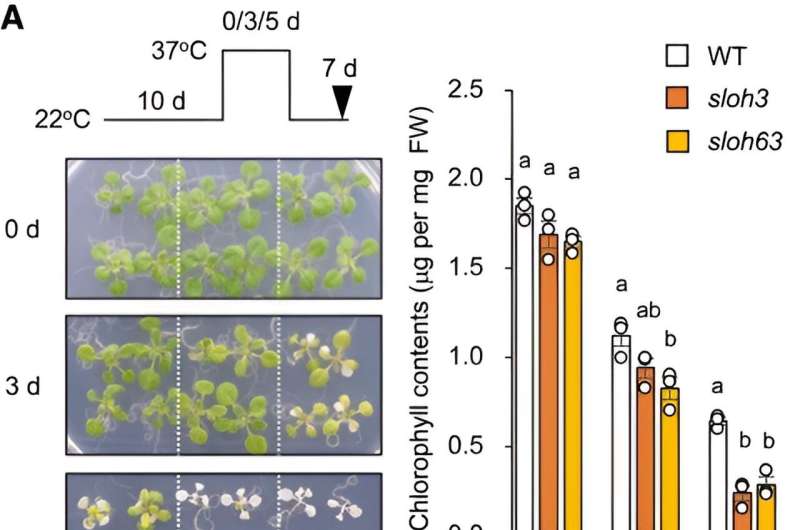This article has been reviewed according to Science X's editorial process and policies. Editors have highlighted the following attributes while ensuring the content's credibility:
fact-checked
proofread
Studies describe genetic basis of long-term heat tolerance in model plant

Two papers published in PNAS Nexus describe the genetic basis of long-term heat tolerance in the model plant Arabidopsis thaliana, with implications for crop breeding. Teruaki Taji and colleagues evaluated dozens of lines of the model mustard weed for both long term (37°C for 36 days) and short term (42°C for 50 minutes) heat stress.
The authors found considerable variation within the species, but little overlap between responses to the two different heat challenges, suggesting that long-term heat stress tolerance is controlled by different cellular mechanisms than the more commonly studied short-term heat stress.
Chromosomal mapping using the F2 progeny of a cross between a long-term-heat sensitive line and a long-term-heat tolerant line identified a genetic locus responsible for long-term heat tolerance, which the authors name LHT1. This locus is identical to MAC7, in the MOS4-associated complex, a region widely conserved in eukaryotes which encodes a putative RNA helicase involved in mRNA splicing.
A single amino acid deletion in a long-term-heat sensitive line caused a loss of function for LHT1, which led to widespread detrimental splicing events.
In another paper, Teruaki Taji and a second team of authors also identified mutant plants that are unusually sensitive to long-term heat stress, but not short-term heat stress, which they dub sloh3 and sloh63.
The team found that sloh63 was also hypersensitive to salt stress. The mutations were traced to the same MOS4-associated complex. In addition, both mutants showed abnormal mRNA splicing events and endoplasmic reticulum stress with subsequent unfolded protein response.
Treatment with a splicing inhibitor led to decreased long-term heat tolerance and enhanced endoplasmic reticulum stress. According to the authors, the results suggest that maintenance of precise mRNA splicing by the MOS4-associated complex is crucial for surviving long-term heat.
More information: Naoya Endo et al, MOS4-associated complex contributes to proper splicing and suppression of ER stress under long-term heat stress in Arabidopsis, PNAS Nexus (2023). DOI: 10.1093/pnasnexus/pgad329
Kazuho Isono et al, LHT1/MAC7 contributes to proper alternative splicing under long-term heat stress and mediates variation in the heat tolerance of Arabidopsis, PNAS Nexus (2023). DOI: 10.1093/pnasnexus/pgad348
Provided by PNAS Nexus

















